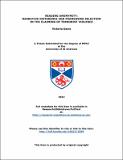Files in this item
Reading anonymity : narrative difference and framework selection in the claiming of terrorist violence
Item metadata
| dc.contributor.advisor | Fierke, K. M. (Karin M.) | |
| dc.contributor.author | Davis, Victoria | |
| dc.coverage.spatial | 303 p. | en_US |
| dc.date.accessioned | 2012-06-08T13:32:38Z | |
| dc.date.available | 2012-06-08T13:32:38Z | |
| dc.date.issued | 2012-06 | |
| dc.identifier.uri | https://hdl.handle.net/10023/2699 | |
| dc.description.abstract | While a significant proportion of terrorist attacks have always gone unclaimed scholarship has noted an increasing number of such acts over the past half-century, which appears to indicate that the claiming of violence may no longer constitute an essential terrorist strategy. The increasing gap between claimed and unclaimed attacks (where “unclaimed” is understood as a terrorist attack for which no credible assertion is issued by the perpetrating individual or group) cannot be explained by existing assumptions, which posit that terrorist groups will seek to advertise their success. This thesis attempts to develop a more complete understanding of this phenomenon by examining al Qaeda’s claim variation within a series of paired case studies to explore the presumption of narrative difference between the two types of attacks. Findings indicate that claimed acts of terrorism tend to be presented via a framework of uncertainty whereas unclaimed acts are presented within a framework of ambiguity. The distinction of ambiguous frameworks is that they allow the terrorist to operate in a newly created narrative space to perpetuate and expand the fear-provoking effects of violence by destabilizing mutually exclusive identities of blame and rendering attacker and victim indistinct, while at the same time confirming the imminent possibility of lethal harm. The variation between models has significant implications for policymakers given that the choice of framework limits or guides one towards particularized courses of action. Given the creative authority of the targeted society as definer of this framework, it remains within the attacked population’s power to eliminate the narrative advantage allotted terrorist actors under conditions of ambiguity. | en_US |
| dc.language.iso | en | en_US |
| dc.publisher | University of St Andrews | |
| dc.subject | Terrorism | en_US |
| dc.subject | Narratives | en_US |
| dc.subject | Media | en_US |
| dc.subject.lcc | HV6431.D28 | |
| dc.subject.lcsh | Terrorism | en_US |
| dc.subject.lcsh | Discourse analysis, Narrative | en_US |
| dc.subject.lcsh | Qaida (Organization) | en_US |
| dc.title | Reading anonymity : narrative difference and framework selection in the claiming of terrorist violence | en_US |
| dc.type | Thesis | en_US |
| dc.type.qualificationlevel | Doctoral | en_US |
| dc.type.qualificationname | MPhil Master of Philosophy | en_US |
| dc.publisher.institution | The University of St Andrews | en_US |
This item appears in the following Collection(s)
Items in the St Andrews Research Repository are protected by copyright, with all rights reserved, unless otherwise indicated.

